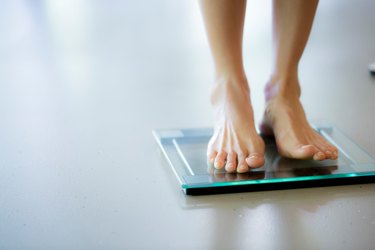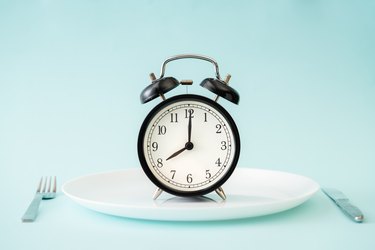
Diet trends may come and go, but one fact remains: The most scientifically proven method of weight loss is to reduce calories. What you may not realize, though, is that cutting your calories too low can actually be bad for your health and even derail your weight-loss goals.
We investigate what the minimum calories really are and how to get the nutrients you need on a low-calorie diet.
Video of the Day
Video of the Day
Tip
It's important to remember that weight loss-related calculations are estimates, because many different factors can influence how your body uses its calories.
How Many Calories Do I Need?
According to the 2015-2020 Dietary Guidelines for Americans, the average adult woman needs between 1,800 and 2,400 calories a day (depending on age and activity level), while the average adult male should get between 2,400 and 3,200 to maintain a healthy weight.
A healthy rate of weight loss is 1 to 2 pounds per week, according to Harvard Health Publishing. Since a pound of fat equals about 3,500 calories, that means you'll need to cut 500 to 1,000 calories from your daily intake and increase your activity level, per the USDA.
Keep in mind that the speed of weight loss will slow after a few months, though.
"By the end of a year, one would typically expect as much as 50 pounds of weight loss if someone actually reduces their calories by 500 a day," says Michael Dansinger, MD, director of lifestyle coaching for diabetes weight loss at Tufts Medical Center, as well as nutrition doctor for NBC's The Biggest Loser.
However, remember that every body is different, so the rate at which you lose weight can vary based on factors besides calorie intake.
Read more: 5 Easy Ways to Cut 500 Calories From Your Daily Diet
Minimum Calories
People assigned female at birth (AFAB) shouldn't cut their calories below 1,200 calories a day, while people assigned male at birth (AMAB) should stay above 1,500, according to both the Dietary Guidelines for Americans and Harvard Health Publishing.
These numbers are based on formulas that calculate the Estimated Energy Requirement (EER) or the amount of energy that the average body needs to function.
Dr. Dansinger explains that by using these numbers as lower limits, most people will avoid harming their bodies. "It's the number of calories that would produce weight loss without causing medical complications for the general public," he says.
In certain cases, it may be medically necessary to eat less than 1,200 calories a day under your doctor's supervision — for instance, if you're about to undergo bariatric surgery, according to University of Washington Medical Center. But don't try these very-low-calorie diets unless your doctor advises it.
Warning
If you feel the need to severely limit your calories when it isn't medically necessary, this could be a sign of an eating disorder and you should visit your doctor, according to the Mayo Clinic.

What Happens If You Go Below?
The most common problems caused by extremely low-calorie diets are fatigue, muscle loss, slowing of the metabolism and nutrient deficiency, Dr. Dansinger says.
"You could lose weight on a 1,200-calorie plan for sure, but that weight could be coming from precious muscle (in addition to fat), which could further lower your metabolism," says Kristin Kirkpatrick, RDN, dietitian, president of KAK Consulting and nutrition consultant at the Cleveland Clinic Wellness Institute.
Extremely low calorie intake also leads to adaptive thermogenesis, when your metabolism slows down disproportionally to the amount of weight you have lost. A November 2014 study published in the American Journal of Clinical Nutrition found that people still had slower resting metabolic rates a year after eating a very-low-calorie diet for eight weeks.
"The body is amazing at protecting you from death, but that mechanism can sometimes also come back to bite you when the goal is weight loss," Kirkpatrick says.
It's tempting to cut out whole food groups such as grains, fats or fruit as a shortcut to cutting calories. But all contain nutrients that are essential for your body to function, and cutting them can lead to nutrient deficiency. "Twelve hundred calories of candy is very different from 1,200 calories of fruits, vegetables and whole grains," Kirkpatrick says.
Long term, a very-low-calorie diet can also cause more serious problems like bone loss, gallstones, thyroid problems and amenorrhea (loss of periods) in people AFAB, Dr. Dansinger notes.
How to Stay Healthy on a Minimum-Calorie Diet
1. Choose Quality Over Quantity
On a low-calorie diet, you need to work harder to provide your body with the nutrients it needs. "What I tell my patients is that if they choose to engage in a 1,200-calorie restricted diet, then they can substitute quality for quantity," Kirkpatrick says. "Getting plenty of fruits, vegetables and healthy fats and protein is important."
Read more: Trying to Lose Weight? Eat More of These 3 Things
2. Create a Balanced Plate
When planning meals and snacks, make sure each has a good balance of protein, carbohydrates, fats and fiber.
"I would suggest protein at breakfast, healthy fats in limited quantities (due to their high calories), such as a handful of nuts or some seeds on a salad, high-quality whole grains, good quality protein and plenty of vegetables, especially leafy greens and cruciferous veggies," Kirkpatrick says.

3. Protein, Protein, Protein
Don't make the mistake of cutting back on protein in order to save calories. This macronutrient helps you feel satisfied, can help keep your blood sugar stable and can also help boost your metabolism.
A December 2012 review in the American Journal of Clinical Nutrition found that across 24 trials, a high-protein, calorie-restricted diet resulted in greater reductions in weight and fat loss than a standard-protein diet.
Read More: 10 High-Protein Snacks You Can Eat on the Go
4. Opt for Healthy Diet Products
Don't fall into the trap of assuming that all products labeled as "healthy" or "diet-friendly" are actually good for you. Look for products that are high in protein and fiber as well as low in sugar and artificial ingredients, Kirkpatrick says.
5. Try Intermittent Fasting
Kirkpatrick recommends time-restricted eating, when you eat only in an eight- or 10-hour window each day. You stick to the same nutrient-dense diet, but the limited timeframe has been found in studies to lead to what's called "unintentional calorie restriction."
"This will not only help with weight loss and reduce the risk of chronic disease, but it may make a 1,200 calorie diet easier to follow," she says.
A November 2018 pilot study, published in the Journal of Nutritional Science, found that a small group of people who only ate for eight to 10 hours a day ate less calories than those who were eating whenever they wanted.
Read more: The Beginner's Guide to 16:8 Fasting for Weight Loss
- U.S. Department of Health and Human Services: "Dietary Guidelines for Americans 2015-2020"
- Journal of the American Dietetic Association: "Self-Monitoring in Weight Loss: A Systematic Review of the Literature"
- American Journal of Clinical Nutrition: "Weight loss, weight maintenance, and adaptive thermogenesis."
- Journal of Nutritional Science: "A pilot feasibility study exploring the effects of a moderate time-restricted feeding intervention on energy intake, adiposity and metabolic physiology in free-living human subjects"
- American Journal of Clinical Nutrition:"Effects of energy-restricted high-protein, low-fat compared with standard-protein, low-fat diets: a meta-analysis of randomized controlled trials."
- Harvard Health Publishing: "Calorie counting made easy"
- Mayo Clinic: "Eating disorders"
- University of Washington Medical Center: "University of Washington Medical Center"